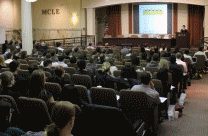Understanding Breath Testing
Recognize the issues so you can challenge the results

- Product Number: 2170190P01
-
CLE Credits, earn up to:
3 substantive credits, 0 ethics credits CLE Credit Note - Print Brochure
-
Add to Favorites List
Choose Date/Location:
-
Product Description
Product Description
Last year, prosecutors voluntarily excluded the results of countless 9510 breath tests after discovering flawed testing that resulted from mistakes officers made calibrating the breathalyzer devices. After a short window of time, the Office of Alcohol Testing claimed that the problems were resolved and related to inadequate officer training and the use of breath test evidence resumed. In the course of the investigation and discovery related to the flawed 9510 breath tests, many troubling pieces of information came to light, including:
- One in every ten breath tests of a citizen are rejected on the 9510 machine, when they would have been accepted on the 7110 test used prior to 2012. It is unclear why, but a machine that exhibits a 10% failure rate is concerning.
- A review of the annual certification process revealed that almost 60% of the machines have either never worked correctly, or have not worked correctly more than half of the time, yet the Office of Alcohol Testing has continued to issue annual certificates that the machines were in working order.
- There is no single consistently used certification procedure for the 9510 machine
- Correspondence from the Office of Alcohol Testing to police departments instructing that machines should be taken out of service when problems are observed appears not to have been heeded.
Since then, litigation has gotten underway to try and resolve the myriad of issues that still exist related to the use—past and present—of 9510 breath tests. The technical nature of these issues and the sheer volume of documentation provided by the Executive Office of Public Safety have posed challenges to the ability of defense counsel to effectively challenge the results of breath tests in their OUI cases. In this seminar the expert faculty prepares you to do just that. They break down the technical, so that you understand what the problems with the machines were. What was malfunctioning? What is the significance of that malfunction? How does it impact your case? They review the documentation that was included in the 670+ pages released by the EOPS. What does it say? Who had knowledge of flaws in the equipment? How long were flaws known of? They walk through the discovery involved in a breathalyzer case. What should you ask for? What should you look for in the documents you receive? Where in the produced discovery are challengeable issues or flaws with the testing revealed? Finally, the expert faculty applies what this most recent breath testing failure teaches us to DUI prosecutions obtained using breath tests from other devices, and specifically addresses accuracy problems with the Draeger Units that date back over 12 years. If you’ve ever defended—or might defend—a case using breath testing, you can’t afford to miss this program.
-
Agenda
Agenda & Materials
-
2:00 – 2:15 PM
Welcome and General Overview
on demand video Add to CartJoseph D. Bernard, Esq., Law Offices of Joseph D. Bernard, PC , Springfield
-
2:15 – 2:45 PM
Overview of the Challenge to the Scientific Reliability of the Breathalyzer in MA from Camblin to Ananias and Prosecution View of the Use of Breathalyzer Results Going Forward
on demand video Add to CartCasey E. Silvia, Esq., Appeals and Training Bureau, Middlesex District Attorney's Office
-
2:45 – 3:15 PM
Recap of Ananias Decision and Issues Presented in the Consolidated Litigation
on demand video Add to CartIrvin J. Rakhlin, Esq., Rakhlin Law , Framingham
-
3:15 – 3:30 PM
Networking and Refreshment Break
-
3:30 – 4:45 PM
Defense and Expert Perspectives on the Fertile Grounds that Have Been Challenged and Grounds that Remain to be Explored; Next Steps for Defense Counsel
on demand video Add to CartJoseph D. Bernard, Esq., Law Offices of Joseph D. Bernard, PC , Springfield
Thomas E. Workman, Jr., Esq.,
-
4:45 – 5:00 PM
"Ask the Experts" Q&A Session
Please Note
MCLE webcasts are delivered completely online, underscoring their convenience and appeal. There are no published print materials. All written materials are available electronically only. They are posted 24 hours prior to the program and can be accessed, downloaded, or printed from your computer.
-
- Faculty

